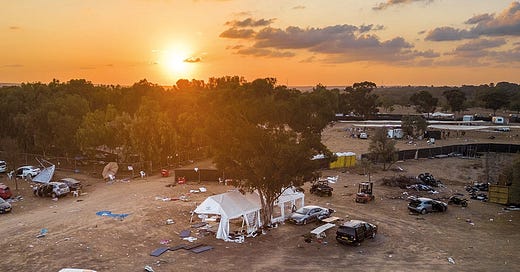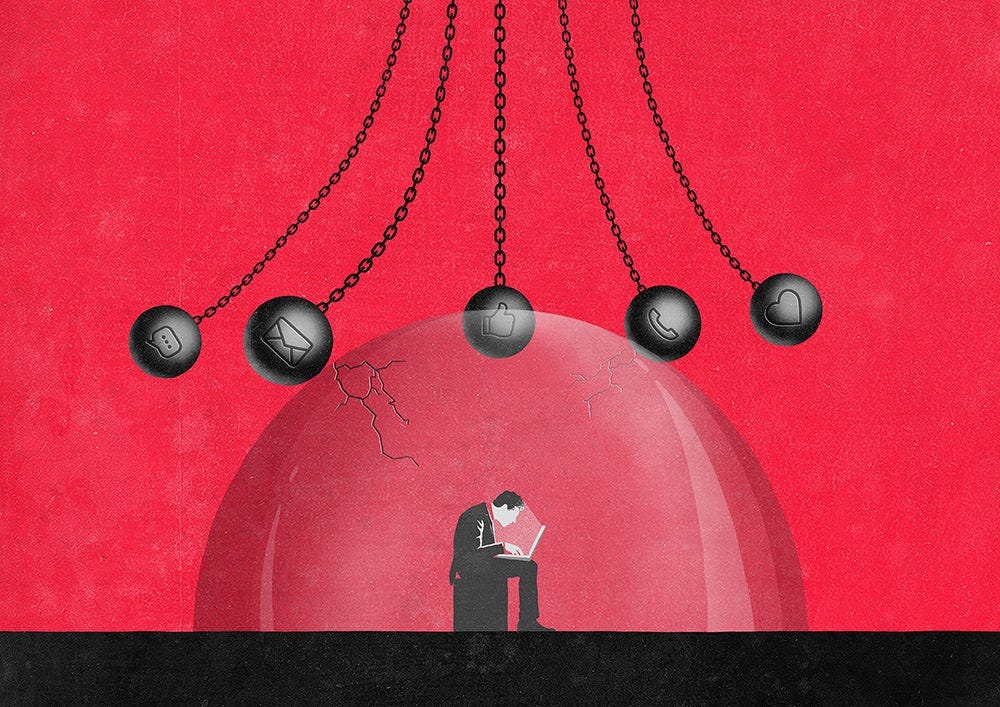The Saturday Read: #35
Inside: Escalation, Mantel, the Barclays, Britney, unreason, and the role of intellectuals.
Good morning, and welcome to the Saturday Read, the New Statesman’s weekly guide to the best writing on ideas, politics, books and culture. This is Harry, along with Will and Pippa.
We have a question for you today. Have you written a book that lifted passages wholesale from Wikipedia and other writers without crediting them? Only joking, that’s a question for our next chancellor. What we’d like to know is: might you be interested in attending a debate hosted by the NS in 2024? I first encountered the magazine at a debate – “Did the left win the 20th century?” – in 2013. Debates needn’t be “gigglingly archaic”, as Will had it last week. With two great speakers on either side, a debate can capture argument in its greatest form. At least I think so. Do you?
Don’t miss Will’s sign-off on Boris Johnson’s latest career move. If this email cuts off before you reach it, you can click here to read this email online. If these pieces intrigue, perhaps you’d like to try a trial subscription to the NS. Read three free articles after registering on our site. A digital sub is only 95p a week. And if you already subscribe to the NS, thank you for being a reader of ours.
1—“The longer the conflict goes on, the harder it will be for Western governments to maintain their support for Israel.”
Saturday 7 October 2023, writes John Gray, will be remembered as the day in which a new epoch of barbarism was born. In this wide-ranging essay, Gray outlines the contours, ironies and tragedies of this bleak new era. WL
In ethical terms, it will be a time when atrocities were accepted as legitimate weapons in human conflict. In its geopolitical dimension, it was the point at which the post-Cold War order finally fractured. We have entered a world of imperial rivalries like that before 1914, which ended in Europe’s suicide in the trenches. After the Second World War, the United States ascended to its global hegemony, which is now in turn coming to an end. The difference is that this time there is no successor on the horizon.
2—“The conflict appears existential, between ‘us’ and ‘them’, and many extend the ‘them’ to include all Palestinians.”
Yair Wallach warns that escalation of the Israel-Hamas conflict may end in genocide. It would be naive, he argues, to think that such an outcome is impossible. We are witnessing the logic of existential war play out in the Middle East. WL
So far, after ten days of bombing, more than 3,000 Palestinians are thought to have been killed in Gaza. Over a thousand of those are children. More than a million residents were ordered to leave their homes and go to the southern part of the Gaza Strip, as Israel prepares for a ground invasion. Such orders bring immediate echoes of the 1948 Nakba – “the catastrophe”, in Arabic, in which 750,000 Palestinians were expelled or fled their homes in what had been British Mandatory Palestine, and then were forcibly prevented by Israel from returning. For many years, Israeli leaders strongly denied responsibility for the depopulation of 1948. But in recent years, the Israeli right has acknowledged and even celebrated it as a justified approach to Palestinians. Activists and journalists are now openly threatening the Palestinians with a “second Nakba”.
3—“Mantel is with us still, communicating from beyond the grave.”
Nicola Sturgeon – no longer first minister of Scotland, nor a recent arrestee – is in this week’s issue in the guise of literary critic. She reviewed a new posthumous set of essays, reviews and lectures by Hilary Mantel (A Memoir of My Former Self), which, Sturgeon reflects, “allows us to see how her theories of life and art knit together”. HL
Mantel had the rare talent of drawing on her own experiences to give voice to that of others. As a childless woman in the public eye, I have often struggled to explain how intrusive, judgmental and hurtful it felt to be so often asked why. She does it for me: “Look at how the childless woman is regarded. The biological clock is often ticking most loudly in the ears of onlookers, critics. A woman who stays childless is still an object of curiosity, misunderstanding and dislike. People want to ask, but they can’t find a tactful way. Sometimes they forget tact and ask anyway.”
4—“The Barclays stood atop the shifting tectonic plates as modern Britain took shape around them.”
I read Jane Martinson’s book about Frederick and David Barclay with particular interest because of the twins’ divisive activities on Sark, the Channel Island where my grandfather lived until his death and where I spent many childhood holidays. But You May Never See Us Again ranges far more widely than this tiny island, documenting how the brothers built an empire of luxury hotels (the Ritz) and newspapers (the Telegraph), and the family feud that brought it all down. An astonishing and at times unbelievable yarn for those still grieving the end of Succession. PB
On 26 August 1993 Country Life printed a listing for a “small private island”. “The words ‘Tax Free Status’ were highlighted in bold.” The island was Brecqhou, a 74-acre rocky outcrop off the coast of Sark. The fortress the Barclay Brothers erected there, with its 100ft walls, turrets and crenellated ramparts, was the largest private house built in Britain for 200 years.
Chinook helicopters airlifted in cranes and diggers, and 90,000 tons of concrete, steel, granite and marble were shipped in. A new water treatment plant, waste disposal system and power station were installed, along with postal, fire and medical services. The finished house had an 80m-long banqueting room and a library with a hand-painted ceiling based on the Sistine Chapel. Admission was through oak doors etched with the Barclay motto: Aut agere aut mori, “Either do or die”.
To realise the UK’s offshore wind potential, we must strengthen our electricity grid
Generating clean energy through renewable sources sits at the heart of the UK’s net-zero ambitions. If the UK is to successfully meet these targets and realise the many benefits of a world-class offshore wind industry, reforms to this vital infrastructure are necessary. Read our latest article with partner WSP to find out the key to unlocking the potential of offshore wind and how the UK can deliver on our net-zero targets by 2050.
5—“Why did everyone treat me, even when I was a teenager, like I was dangerous?”
This week Anna Leszkiewicz read the memoir everyone’s talking about, Britney Spears’s The Woman in Me, which focuses on the punishing conservatorship through which her father controlled everything – from what she ate (chicken and canned vegetables) to her birth control – for 13 years. It’s a dark fable of fame, tabloid culture and misogyny – and of a life spent in a kind of Neverland of childlikeness. PB
When the video for “… Baby One More Time” was released in 1998, when she was 16, she was granted the type of fame bestowed upon only a few women in a generation. The golden, cursed fame of Marilyn Monroe and Princess Diana, in which you become an idol, a fantasy, an ideal – and lose your personhood in the process. The ideal that Britney embodied was the all-American, California-blonde, virginal, girl-next-door teenage dream. An ideal that, by definition, was impossible to sustain. “At what point,” Spears wonders looking back, “did I promise to stay seventeen for the rest of my life?”
6—“Great literature shows us how silly and staid are the categories we use in everyday life.”
First person to find Ann Manov a film she likes wins a set of steak knives. HL
We are surrounded by strange and complicated people, enigmas even to themselves, and we resort to stereotype to make sense of it all. He’s a “creep”; she’s a “whore”. “Cat Person”, Kristen Roupenian’s 2017 short story, was a brilliant example of this: in prose that is withholding, interior and sparse, a young woman becomes infatuated with a slightly older man, spends an awkward night with him, disgusted by his body but proud of her own, and then stops responding to his attempts at contact. They run into each other a few months later, and he texts her asking what happened: had she not felt the connection he had? Again, she ignores his messages, increasingly pathetic and cruel, until he finally sends her one word: “Whore.”
7—“The compaction of grandly conspiratorial thinking and unreliable reporting did not start with recent events in Israel.”
Our political editor, Andrew Marr, examines what he dubs “the cloud of unreason” fogging up Britain. Between Big Tech and AI, social media and foreign warfare, an increasing scepticism is building about public institutions. A radical transformation of our politics is underway. WL
Today, we have a privation of knowing, a Cloud of Unreason billowing through our politics. It is often described as “conspiracy theories” but it is more than that. It is a wholesale rejection of a plain-daylight grounding of facts that would ordinarily connect citizens and allow us to talk, in fact, politically. Inside this dark cloud, it seems, world government is being stealthily created, machinating Jews are everywhere – some things haven’t changed since medieval times – controlling us through, er, town planning; and lies about global warming; and lockdowns; and vaccines manufactured by Chinese communist agents. Those inside the Cloud of Unreason cannot see out. Those outside cannot see in. The division between it and the world of party-political conferences, medical experts, agreed facts about contested issues such as the pandemic, or wars in Ukraine or Gaza, or climate change, is absolute.
8—“The loudest class of reactions – the most numerous, most anguished, most indignant – has been to the least consequential of statements: those of university students.”
George Scialabba ruminates on the responsibility of intellectuals in war. HL
Many have called the Hamas massacre Israel’s 9/11. If so, we must not repeat that event’s sequel. The response of American intellectuals to 9/11 was shameful. Only one explanation was allowed: the terrorists hated American values: democracy, progress, science, freedom. The notion that they had grievances, legitimate or fanciful, about American foreign policy was derided as “apologetics for terrorism” or “reflexive anti-Americanism”, even though the George W Bush White House’s chief counterterrorism expert, Richard Clarke, said the same thing, citing publications by al-Qaeda.
Will’s Best of the Rest
FT: New Rachel Reeves book lifts from Wikipedia. They’re calling her the “Iron Chancer” apparently.
Guardian: UN’s António Guterres calls for immediate ceasefire in Gaza.
Euronews: Macron wants international coalition to fight Hamas. Absolutely no downsides to this idea at all.
Financial Review: Murdoch circles as Telegraph bidding opens.
Wired: Everyone is a luddite now.
Jake Sullivan: The sources of American power.
Anne Helen Petersen: How millennials got old. They’re likely to increase in age as time goes on.
Evan Osnos: China’s era of malaise.
Harold Meyerson: Why you need to understand Nixon. Every time I see a photo of Richard Nixon it makes me feel tearful.
Andrew Sullivan: It’s time for Biden to get off the stage. Still banging this drum.
The 40 coolest neighbourhoods in the world. King’s Cross has been upgraded.
Italy will ban synthetic meat. Basta!!!
Elsewhere on the NS
To Germany, where Wolfgang Münchau advises readers to take Sahra Wagenknecht’s new left-populist party very seriously indeed. This is an organised team with a real agenda.
Randall Hansen tells Will Dunn that the 1973 Opec oil embargo dictated every event that came after it. It’s less rogue than it sounds.
Lewis Goodall makes a compelling case that, with the surge of misinformation during the Israel-Hamas war, we need new rules for media in the digital age.
Where have all the Tory women gone, asks William Atkinson.
Arnold Schwarzenegger has some life advice for you. Should you take it? Will is, to put it mildly, rather sceptical about this.
John Simpson writes about his role in the BBC’s Hamas controversy for this week’s Diary.
“A pity it wasn’t you.” Katie Stallard reflects on what Li Keqiang’s death means for Xi Jinping.
Sign up for our weekday political newsletter here:
And with that…
Forty-four years ago this month, the British gathered around their televisions for a broadcasting first. Harold Wilson, out of office for three years, was about to become the only former prime minister to host a prime-time chat show. Friday Night, Saturday Morning would eventually be remembered as a disaster, which exploded Wilson’s reputation for media savviness. He had trouble thinking of questions to ask guests. At times he seemed not to know where he was. One critic described Wilson’s reading the autocue as if it were the Rosetta Stone. Cruel, but funny.
Cruel and funny were the words that you might use to describe Boris Johnson’s announcement on Friday afternoon that he would soon be taking up a role as a “presenter, programme maker and commentator” on GB News. Johnson, who is grimly ageing into the face of an 18th-century whoremonger, promised to share his “unvarnished views” on political and global issues. He becomes the first former PM since Wilson to take up such a prominent television role.
The joke here is almost certainly on Johnson. His “unvarnished” views are socially liberal and boosterish on foreign intervention. Neither will be received well by the channel’s audience, who are frightened of globalism and see rights for trans people as spectres of a new dark age.
What Johnson has in common with them, I suppose, is that many of his views are detached from reality, and float freely above it like a balloon. Wilson smashed up his reputation by appearing on television. Johnson made his through the medium 20 years ago. But playing the clown for Ian Hislop and Paul Merton is rather different to playing the blood-spitting populist for GB News. I expect the channel to maintain its startling growth and real influence on Conservative politics. But in spite, not because of Boris Johnson.
Thank you for reading. Don’t miss out – subscribe to the New Statesman and stay up to date with everything you need: from news and analysis to comment and criticism.
Whether you’re looking for a sharp blog or a finely written feature, the New Statesman has you covered. Have a good week, and catch you next Saturday.
Thanks to Chris Bourn and Pippa Bailey.





















After all these years, given the progress we've made understanding the very early stages of dementia, it should now be crystal clear that whilst Harold Wilson was, indeed adept with the media & on top of his game, once; (and probably for most of his career) he nor anyone else could readily have realised that he was experiencing a progression of early-stage dementia.
In my opinion it was this that undermined his effectiveness as a previously erudite & vigilant media-savy politician. So it's a shame that he's too often remembered as an exposed shambles, rather than a revered Shaman.
The Italian synthetic meat ban has been withdrawn apparently (the vid linked is six months old)